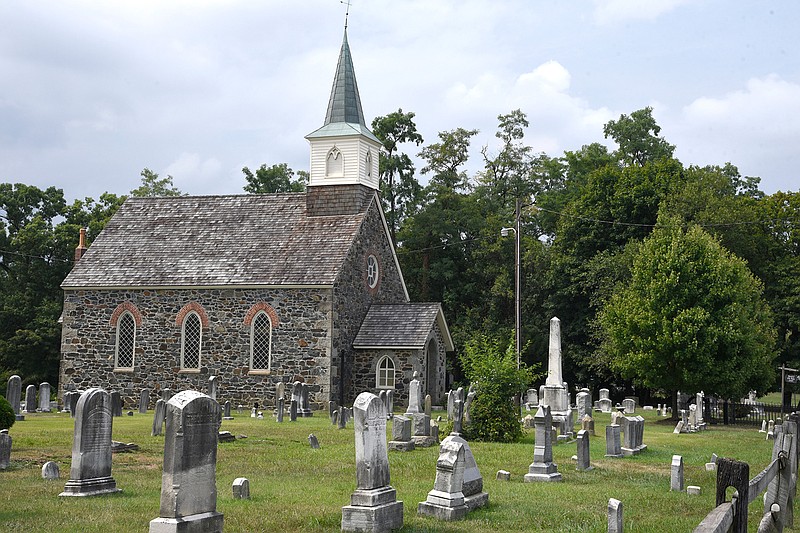CATONSVILLE, Md. - Despite the rumors, no, it's not a mass grave off Ingleside Avenue in Catonsville. It's 46 graves, mostly unmarked and left to be covered by brush and vines for decades.
Forty-six children, some just a day old, dead from various causes and, until recently, left forgotten underground at the cemetery at Historical Old Salem Lutheran Church.
But today, a visitor would see a memorial, cut out of granite and laid on the ground, with small flower bushes planted behind it. Nicholas Grempler, 17, cleared brush and designed and built the memorial as part of his Eagle Scout project. He "wanted to bring a positive energy to the space," Grempler said.
"I feel honored to do this and really thankful that I was able to do this," he said.
The rising senior at Catonsville High School said the actual work day - including clearing brush, ripping vines and building the stone memorial - took about 12 hours, from 6 a.m. to 6 p.m. Salem Evangelical Lutheran Church held a small celebration and dedication to the memorial on Aug. 4.
Grempler, a lifelong member of the church, said he was only able to complete the project because people donated time to help with construction and brush work, as well as money to purchase supplies and the memorial rock itself, which was supplied by Merkle Monuments at cost.
"I was really appreciative of that," Grempler said. "This is something the entire community can get behind."
Grempler said he first started to hear about the children in the cemetery while he was undergoing confirmation at Salem Lutheran, in conversations with his pastor, David Asendorf. Grempler said he had maintained an interest in the cemetery at Old Salem since learning about the section of unmarked graves earlier in high school.
Asendorf was on vacation and could not be reached for comment.
Salem Evangelical Lutheran Church dates its earliest history to September 1845, when the congregation was organized, according to a cemetery book maintained by the church.
In 1849, the church formalized bylaws and ordinances. On Nov. 1 that year, a man named Joseph P. Fusting and his wife, Caroline Fusting, sold a plot of land to the Trustees of Salem Church for about $300, according to "The Catonsville Lutheran Church: A Sketch of its Origin," a local history book published in 1919 by George C. Keidel.
The very first sermon in the building, preached in June 1850, was spoken in German. In an invitation to the church's consecration in 1850, the Old Salem building, which still stands at 701 Ingleside Ave., was described as "a spiritual light-house, guiding to the port of Heaven, or a lightning-rod averting the sin-begotten thunders of the Almighty."
Keidel's history of the church does not name an exact date as to when the congregation started using the church's property as a graveyard. It does, however, name Anton Lauman as having died in 1861, the earliest date attached to any of the tombstones in the graveyard.
"Time brings many changes both to places and people, and those that are gone have passed on to their eternal reward," Keidel wrote about 70 years after the congregation formed.
What Keidel does not mention, though, is a plot in the southwest corner of the graveyard. It had been thought by members of the congregation at Salem that those buried in that part of the graveyard died in some terrible event, like a plague of typhoid or the Spanish flu.
"There seemed to be a mystery about them, the fact that it's this unmarked section," said Judy LeGath, archivist for Salem Evangelical Lutheran Church and an employee of the Baltimore County Public Library.
LeGath said, in fact, that it's likely the graves once had wooden markers, but that they deteriorated over the decades. It was not a tragedy that killed the 46 children buried, LeGrath said, though each is a sad story.
"Just think of those tiny little coffins in there," she said.
Rather, it is more likely that those buried there died from complications related to childbirth or other diseases, like the flu - not in one giant epidemic.
As LeGrath noted, there was no neonatal intensive care unit in the late 19th century.
According to the church's records, most of the graves did not at any point have given names affiliated with them, indicating the children did not live very long. Most were recorded only as "child of" a family, or "grandchild of" a family. Some just list them as being from a hospital.
Records indicate the graves, now marked with a memorial, were dug between 1895 and 1922.
According to Jim Long, a volunteer coordinator with the Historical Society of Baltimore County, there is no easy way to estimate the number of old church cemeteries or graveyards in Baltimore County.
"Certainly there are a lot of them out there," he said. "You could probably pick any old church out there in the county, and there's probably a cemetery. We try to be very thorough, (so) I couldn't even give a guess."
Grempler, who researched the church and the graveyard as part of his project, said he was surprised when he discovered one marked grave in the section - a white crucifix, dedicated to Benjamin Lapole, who was born Oct. 23, 1922, and died Oct 24, 1923.
He said finding the marker was a surprise because that part of the graveyard had become so overgrown with vines and brush. At one point during the cleanup, a group of volunteers had to tie a line around some vines and tug in order to get them off a tree, he said.
Because of the Boy Scout motto "Be Prepared," Grempler brought a first-aid kit and Benadryl for allergies, he said.
Grempler, who said one day he hopes to become a U.S. president, should find out whether he'll officially be granted the rank of Eagle Scout in a couple of weeks. He's not sure where he wants to attend college, but he knows he wants to double major - political science and something else, maybe history - with a minor in Spanish.
He said he hopes his project brings a positive energy to the graveyard and that it reminds people to be thankful for their own lives and to make the most of them.
"These kids didn't have a chance to live life as all of us do," he said.
Michele Miller, author of the cemetery book - the proceeds of which go toward maintaining the historic site - said the new memorial was a huge positive for the cemetery, because the children would be "otherwise completely forgotten."



